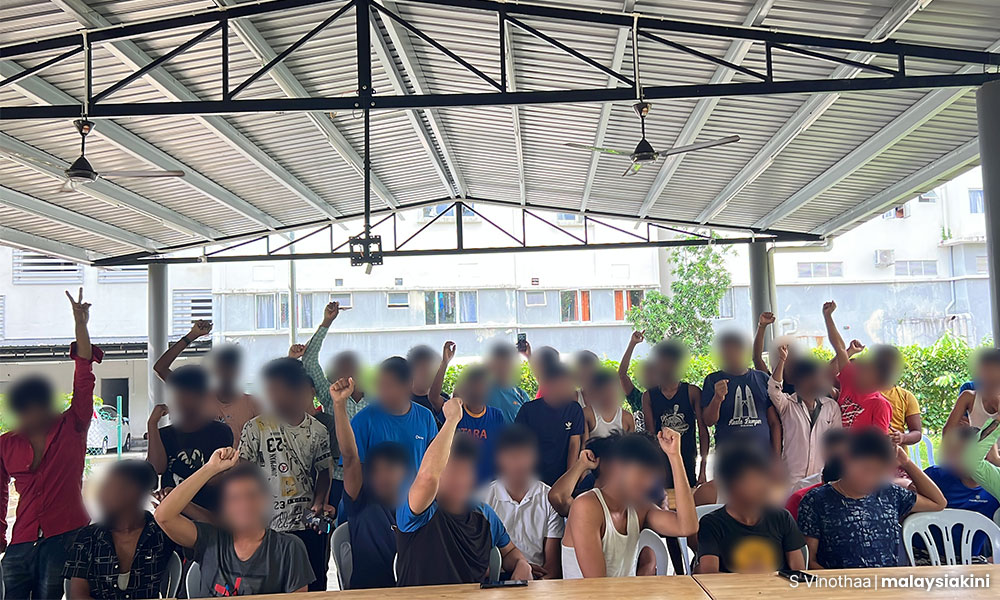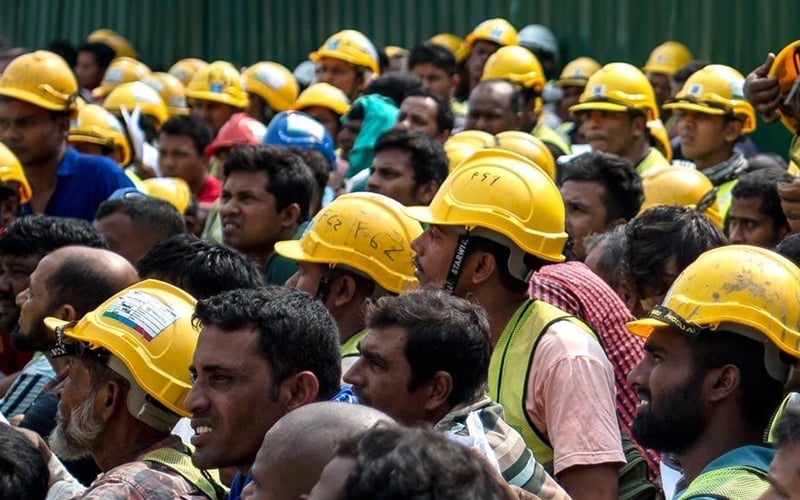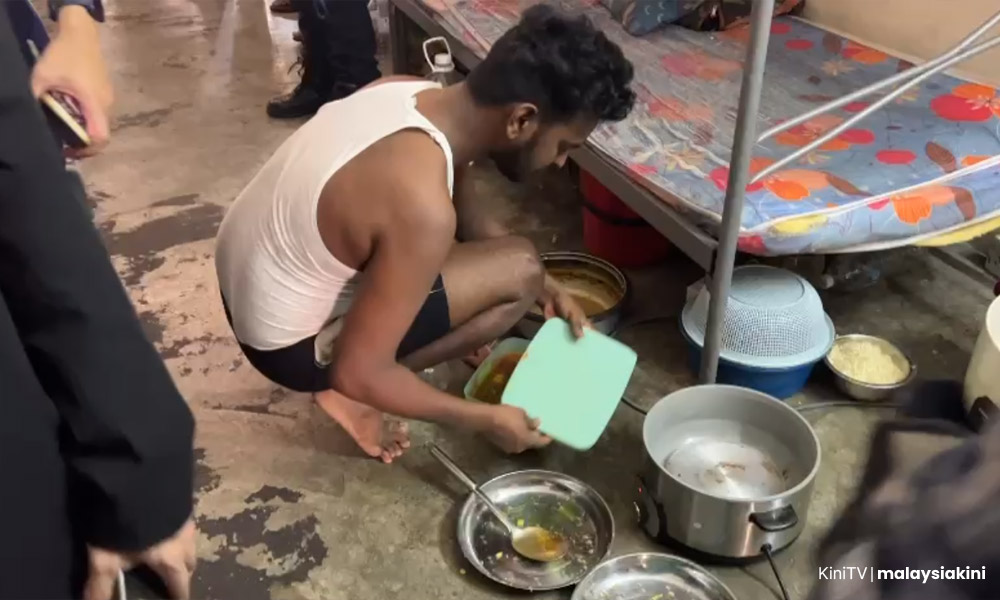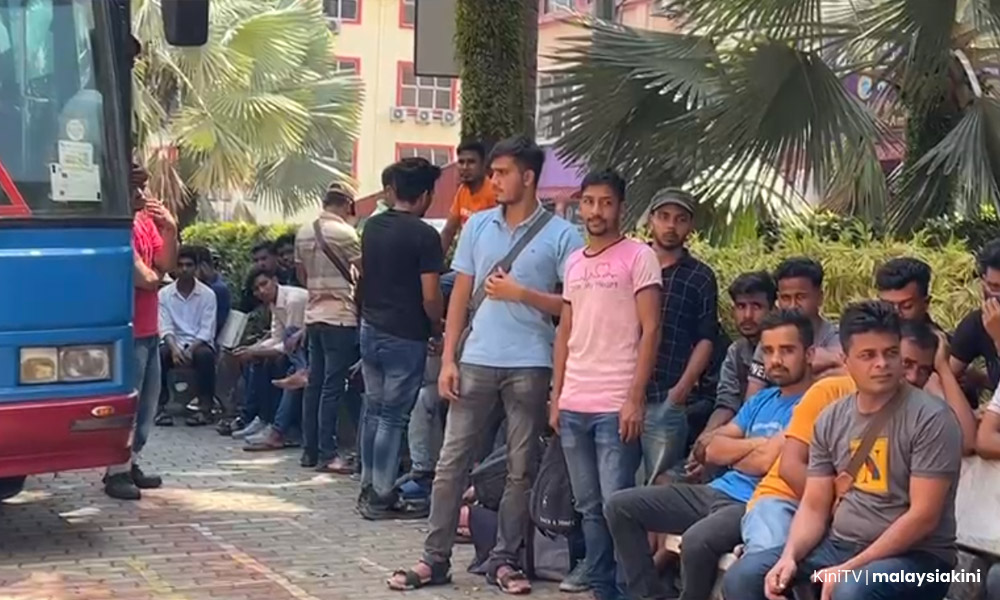2nd March 2024: Bangladeshi MP – New Act drafted to monitor sub-agents of foreign workers and undermine criminal syndicate trafficking Bangladeshi workers for forced labour in Malaysia
A new act was drafted by the Bangladeshi MP to monitor sub-agents of foreign workers and undermined syndicates trafficking Bangladeshi workers for forced labour in Malaysia. Currently, more than 1,000 Bangladeshi workers are detained in Malaysia for being here without documents. This is perhaps one of the reasons why the Bangladeshi government did not record remittances at a consistent rate, despite the influx of so many citizens to Malaysia last year.
Original source: Suara by Voice – 2nd March 2024
“It is very important for the Bangladeshi government to deal with the issue of employment abroad efficiently,” said the chairman of the country’s Parliamentary Caucus on Migration and Development, Tanvir Shakil Joy.
The main source of foreign exchange earnings for Bangladesh is its workers abroad who send money back to the country. Malaysia is the second largest destination for Bangladeshi workers, with 351,000 arrivals last year.
However, annual inflows have been less than RM104.28 billion (USD22 billion) over the past two years.
However, in the past year, Malaysia’s reputation was also tarnished with workers caught in employment fraud.
Last year, hundreds of Bangladeshi human trafficking victims were rescued by the Department of Labor (JTK). They are stranded and may become victims of cross-border human trafficking networks in the region.

In Bangladesh, layers of sub-agents, from the countryside to the cities, are involved with exorbitant recruitment fees, which result in workers being trapped in forced labor practices or tricked into fraudulent syndicates.
Tanvir is from Bangladesh’s ruling Awami League Party and he represents 395,000 residents in Sirajganj-1 in northern Bangladesh. He has received numerous complaints regarding employee misconduct, high recruitment fees, employment fraud and labor rights violations.
These issues often push foreign workers to either become illegal aliens or have to flee from a harsh work environment.
The government of Bangladesh chose an unusual solution to deal with it.
Law for sub-agents
The country will draft legislation to make sub-agents in the overseas employment sector legal by the end of this year.
“Sub-agents, who previously moved informally, will no longer be able to avoid monitoring the law as soon as this law is gazetted.
“We want to address the main issues that are causing problems in the overseas employment industry at the moment: fraud and high recruitment fees,” he told Malaysiakini.
Sub-agents, known as ‘dalals’, move independently and earn a commission based on the fees collected. Therefore, the large number of sub-agents makes it difficult for the authorities to monitor.
“They will be required to join any of the 700 legitimate employment agencies, limit operations to one area only and register for an identification card that will enable monitoring.
“Employment agencies will be responsible for the actions of sub-agents under them and can be fined or even jailed for a short period.
“The identity of sub-agents and their identification numbers will be published online so that workers can identify their legitimacy without having to leave their respective villages,” he said.

Disaffected workers who marched to the police station in Johor in December 2013
Tanvir said the government’s initial efforts to root out sub-agents through stiff fines and community warnings did not bear fruit.
In fact, sub-agents are integrated into the recruitment system since they gain the trust of the community through personal relationships, such as family relationships.
“They think ‘he is my brother, he is my neighbor, so I can trust him’,” said Tanvir again.
The new law is in the final stage
About five years ago, a parliamentary caucus and civil society organizations (CS) of Bangladesh that investigated the matter proposed that sub-agents be included in the framework to legalize and supervise their operations.
Acknowledging the complexity of the process, Tanvir said that “It’s a long time, taking into account the pros and cons. It is not an easy task.”
Last year, the Bangladesh government gazetted amendments to the Migrant and Overseas Employment Act 2023, acknowledging the need to establish comprehensive regulation of sub-agents in the overseas employment sector.
The Ministry of Law, Justice and Parliamentary Affairs and the Ministry of Overseas Employment and Expatriate Welfare are finalizing a new law that will be tabled in parliament this year.
It will outline the responsibilities, duties and code of conduct for sub-agents.
The aim is to ensure accountability and fair handling in the recruitment process, which will safeguard the rights and interests of employees, employers and employment agencies.
Because the recruitment fee is high
Working in Malaysia is a challenging journey for most Bangladeshi job seekers, with high recruitment fees to begin with.
But it paves the way for a better future for them and their families.
According to Tanvir, returning home before at least five years in Malaysia is not an option for them, even if the employee’s original contract is for one year.
“Most Bangladeshis do not want to settle here but want to work for 10 to 15 years, earn a lot of money, build a house in their hometown, and save for their children’s education or start a small business.
That is their only aspiration and when one goes abroad, their extended family will depend on them.
“They take risks by mortgaging land, selling livestock and making loans with high interest because they are confident that they can get it back and have enough money left over for a better future,” said Tanvir again.
2nd March 2024: FMT Bangladesh to restructure migrant worker recruitment system

MP says his government will legalise sub-agencies to minimise issues of agents scamming workers or charging exorbitant fees.
Original Source: FMT by FMT Reporters – 2nd March 2024
Tanvir Shakil Joy, chairman of the Bangladesh parliamentary caucus on migration and development, says sub-agents will be required to align with any of the 700 legal recruitment agencies. (Bernama pic)
PETALING JAYA: Dhaka is set to introduce new legislation that will legalise sub-agents in the overseas employment recruitment sector by the end of 2024, a Bangladeshi MP said.
“Sub-agents, previously operating informally, will no longer evade legal scrutiny once the law is enacted.
“We aim to address the primary issues afflicting the foreign employment industry right now: job scams and high recruitment fees,” Tanvir Shakil Joy said to Malaysiakini, noting that more than 350,000 workers are registered in Malaysia and their income is a key source of revenue for Dhaka, reported to be roughly RM100 billion over the past two years.
However, he said the government is facing an uphill task, because of the sheer volume of “dalal” agents, amid reports of hundreds of workers stranded in Malaysia with no jobs.
Tanvir, the chairman of the Bangladesh parliamentary caucus on migration and development, said one of the key problems is that the sub-agents are intertwined with local communities, and trusting workers sign up simply because they do not believe their supposed friend will dupe them into paying exorbitant fees.
“Sub-agents will be required to align with any of the 700 legal recruitment agencies, limit their operations to one area, and register for an identification card that will enable oversight,” he said.
He said it is hoped that making the agencies responsible for their sub-agents – including stiff fines and possible jail time – should produce better results than previous punitive measures, which included penalties and community warnings.
March 2nd 2024: Bangladeshi MP: Over 1,000 undocumented citizens in Malaysian prisons

Original Source: Malaysiakini – by S Vinothaa March 2nd 2024
Over 1,000 Bangladeshi’s are currently in Malaysian prisons due to their undocumented status.
This could be one reason why, despite the unprecedented influx of Bangladeshis to Malaysia last year, its government is not recording a corresponding increase in foreign remittances.
“It is very important for the Bangladesh government to address issues plaguing overseas employment effectively,” said the chairperson of its Parliamentary Caucus on Migration and Development, Tanvir Shakil Joy.
Workers sending money home is a key source of foreign currency income for Bangladesh. Malaysia ranks the second-largest destination for its workers, with 351,000 recruited last year.
Despite the exodus, annual remittances have hovered below RM104.28 billion (US$22 billion) over the past two years, disappointing the government’s expectation of a significant surge.
However, last year, Malaysia also earned notoriety for workers trapped in job scams. Hundreds of Bangladeshis were rescued from deplorable conditions across Malaysia by the Labour Department.

They were stranded with no jobs and possibly victims of trafficking networks that span across borders in the region.
In Bangladesh, layers of sub-agents from rural areas to the city partake in exorbitant recruitment fees that entrap workers in forced labour conditions or dupe them into job scams.
Tanvir, who is from the country’s ruling Awami League party and represents 395,000 constituents in Sirajganj-1, northern Bangladesh, has been receiving many complaints of worker abuse, high recruitment fees, job scams, and labour violations.
These issues often lead individuals to either become undocumented or compel them to flee unbearable work conditions.
The Bangladesh government is opting for unconventional solutions to stem the rot.
Legalising sub-agents
Bangladesh will introduce a law to legalise sub-agents in the overseas employment recruitment sector by the end of this year.
“Sub-agents, previously operating informally, will no longer evade legal scrutiny once the law is enacted.
“We aim to address the primary issues afflicting the foreign employment industry right now: job scams and high recruitment fees,” he told Malaysiakini.
Sub-agents, also known as “dalal”, operate independently, earning commissions based on collections which is why the sheer volume of sub-agents poses a monitoring challenge for the government.
“They will be required to align with any of the 700 legal recruitment agencies, limit their operations to one area, and register for an identification card that will enable oversight.
“The recruitment agencies will bear responsibility for the actions of their sub-agents and will stand to incur fines or even short jail terms.
“The identities of the sub-agents along with their ID numbers will be published online for workers to verify their legitimacy without the need to leave their villages,” he said.
Tanvir said the government’s initial efforts to eradicate sub-agents through strict penalties and community warnings proved futile.

Jobless migrant workers
In reality, sub-agents had seamlessly integrated into the recruitment system, as they enjoyed the community’s trust fostered by personal connections, such as being neighbours or having familial ties.
“They think, ‘He is my brother, he is my neighbour, so I can trust him’,” he said.
New law being finalised by Bangladeshi MP
About five years ago, the parliamentary caucus and Bangladesh civil society organisations investigating the matter proposed that sub-agents be incorporated into a framework to legalise and regulate their operations.
Admitting to the complexity of the process, Tanvir acknowledged, “It has taken us a long time, given the pros and cons involved. It hasn’t been an easy task.
Last year, the Bangladesh government enacted amendments to the Overseas Employment and Migrants Act 2023, recognising the need to establish comprehensive regulations for sub-agents operating within the overseas employment recruitment sector.
The Law, Justice, and Parliamentary Affairs Ministry and the Expatriate Welfare and Foreign Employment Ministry are finalising the new enactment to be tabled in the Bangladesh Parliament this year.
The law will outline the responsibilities, duties, and code of conduct for sub-agents.
Its objective is to ensure fair conduct and accountability in the recruitment process, ultimately safeguarding the rights and interests of workers, recruitment agencies, and employers.
Why Bangladeshis pay high recruitment fees
Coming to Malaysia is the start of a challenging journey for most Bangladeshi job seekers and the exorbitant recruitment fee serves as a painful initiation, yet it paves the way for a hopeful outcome for the worker and their families.
Returning before completing at least five years of work is not an option, even if the initial contract is for just one year, said Tanvir.
“Most Bangladeshis don’t want to settle here but want to work for 10 to 15 years, earn a lot of money, build a house back home, have savings for children’s education, and start a small business.
“That is their only aspiration and whenever someone goes abroad, their extended family becomes dependent on them.
“They take the risk of mortgaging their land, selling their livestock, and borrowing from moneylenders with high interest rates because they are confident they can earn it back and still have enough money for a better future,” he explained.
Additional Reading
Background 26th February 2024: Statement by Andy Hall on Joint KDN, KSM and MAPO Operation to Rescue More Destitute and Stranded Victims of the Alleged Criminal Syndicate Trafficking Workers from Bangladesh
See also FMT 1 Mar 2024: Duped Bangladeshi worker (another victim of alleged criminal syndicate trafficking Bangladeshi workers for forced labour in Malaysia) dies while trying to go home
See also RTV Online 1st Mar 2024: Expatriates die without getting work in Malaysia (google translate)
See also 27th February 2024: SCMP – Malaysian firm probed for human trafficking after 93 Bangladeshi workers found abandoned
See also 26th February 2024: FMT – Stern action against company that duped Bangladeshi workers in Cheras
Background 26th February 2024: Bernama – Home, HR ministries: Firm facing legal action for abandoning 93 Bangladeshi workers brought into Malaysia last year
See also – 25th February 2024: FMT – More than 100 Bangladeshi migrants stranded in Cheras without jobs, says activist Andy Hall
Business Standard 18th Feb 2024: Bangladeshis pay much higher than peers (US$4500++) to reach Malaysia job market – syndicates, impunity and systemic forced labour
Malay Mail 8th Feb 2024 – Activists: Duped Bangladeshi workers in Malaysia sought RM2m in unpaid wages, but only got half(first reported compensation settlement for Bangladesh Malaysia organised crime syndicate victims being trafficked for forced labour in Malaysia)
See also: Related story – FMT 30th Dec 2023: Migrants being duped into Malaysia because of govt’s failure to curb criminal trafficking syndicates and organised crime network, says activist Andy Hall
See also: Malay Mail 8th Feb 2024: HR Ministry hails mediation outcome despite claims duped Bangladeshi workers were short-changed
See also: 8th February 2024: FMT – Bangladeshi workers win RM1mil in unpaid wages
See also: 7th Feb 2024: Bangla Tribune – Job trap in Malaysia, 733 Bangladeshis in salary uncertainty
See also: 6th February2024: Benar News – Malaysian Labor Court orders employers to pay Bangladeshi workers RM1 million in unpaid wages – first reported compensation settlement for Bangladesh Malaysia organised crime syndicate victims being trafficked for forced labour in Malaysia
See also: 16th January 2024: FMT – 751 duped Bangladeshi migrant workers in Pengerang case file RM2 million claim for unpaid wages resulting from situation akin to forced labour, stranded and destitute on arrival in Malaysia (includes comments by Andy Hall)
See also: 6th Jan 2024: FMT: Away from families, in debt, and jobless in a foreign land
See also: 6th Jan 2024: New Strait Times – Company that promised 171 Bangladeshi workers non-existent jobs blacklisted
See also: 5th Jan 2024: New Strait Times – MCA: Don’t just fine employers, hold ministry accountable as well for unemployed foreign workers
See also: FMT 30th Dec 2023: Migrants being duped into Malaysia because of govt’s failure to curb criminal trafficking syndicates and organised crime network, says activist Andy Hall
See also: 30th Dec 2023: New Strait Times – Recruitment agencies accused of deception as Bangladeshi victims speak out on exploitation and fear
See also: 29th Dec 2023: Malay Mail – Set up probe on exploitation of migrant workers and new ministry to manage their affairs, Suhakam tells Putrajaya
See also: 28th Dec 2023: New Strait Times – ‘Company involved in 171 Bangladeshi migrant worker scandal not licensed to recruit’
See also: 28th Dec 2023: FMT – Malaysia has entered ‘slave labour’ territory, says ex-MP – Charles Santiago calls for specific set-ups to manage migrant workers
See also: 27th Dec 2023: New Strait Times – MTUC demand govt, MACC probe into corrupt recruitment practices of foreign workers
See also: 27th Dec 2023: New Strait Times – Strict action against employers, agencies neglecting 171 Bangladeshi workers: MEF
See also: 27th Dec 2023: FMT – Bangladeshis duped over jobs are victims of human trafficking, says rights group
See also: 26th Dec 2023: FMT – Azalina wants urgent probe into 171 Bangladeshis duped over jobs
See also: 26th Dec 2023: FMT – High recruitment fees make greedy agents bring in workers, says group
See also: 25th Dec 2023: FMT – Probe recruitment agents, MACC told after arrest of Bangladeshis
See also: 25th Dec 2023: FMT – Human resources ministry comes to the rescue of Bangladeshi workers
See also: 25th Dec 2023: FMT – Cops nab 171 foreigners protesting lack of jobs in Johor
See also: 25th Dec 2023: The Star – Foreigners march to police station to complain about agent, get hauled up by Immigration Dept instead
See also: 5th Nov 2023: Malaysian HR Minister pledges nationwide operations concerning plight of Bangladeshi migrant workers in Malaysia following Andy Hall’s complaint letter to the OHCHR
See also: 30th Oct 2023: FMT: Andy Hall refers stranded Bangladeshi workers’ plight in Malaysia to UN Human Rights Council
See also: 19th Oct 2023: Malaysia facing huge excess of 1/4 million migrant laborers
See also: 21st Sep 2023: Malaysian government has 15 source countries for foreign workers – Comments by Andy Hall
See also: 20th Sep 2023: Rate of abused Bangladeshi workers’ entry into Malaysia worrying, says migrant rights activist Andy Hall
